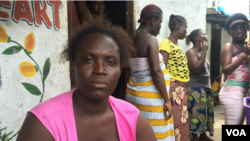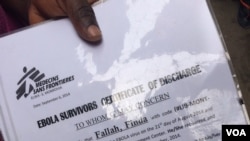For Liberian survivors of Ebola, the struggle is not over. Many have lost property and family members, and often face tremendous stigma after being released from the hospital. Unresolved medical issues are another problem. Despite their suffering, they are still waiting for support a year into the Ebola crisis.
Finda Fallah’s life turned upside down over the course of one week. She lost seven family members. She herself got infected. When she was discharged from an Ebola treatment center in September, her problems did not stop.
To prevent a spread of infection, all her belongings were burned - including her house in West Point - one of Monrovia’s poorest areas. Fallah had to sleep on the street until a foreign aid worker found her. Fallah said she was supplied with food only once - months ago.
“For December they give me supplies. [Since then,] I not see supply,” she said.
She says she has no money or wherewithal to start over as a petty trader.
Depression, trauma and financial strains
People shun them. Landlords terminate their leases. Some lost their jobs. Many survivors also suffer from headaches and eye problems. Doctors do not know yet if these Ebola side effects are only temporary.
To make their voices heard, survivors formed a network under the umbrella of Liberia’s Ministry of Health and Social Welfare last September.
Korlia Bonarwolo was part of that, but then broke away and formed his own group. He said that after months without support, it seemed to him the government only used survivors to attract foreign aid.
Deputy Health Minister Tolbert Nyenswah denied these allegations and says he hopes Bonarwolo and his group will come back so they can continue to work together.
“These are our heroes. They survived a very horrific disease. They went through a horrible, horrible situation. The pains. The fear. Their colleagues died,” said Nyenswah.
But even the survivors group that remains under the ministry is not happy. Their head, Patrick Faley, said the government is not using the Ebola aid to help survivors.
“There are a lot funding coming for the Ebola situation and I can speak that we have not received a dime from the national government yet,” said Faley.
Phones but no cash
The majority of foreign donors only began addressing survivors’ needs at the beginning of this year.
In March - more than a year after the world’s worst Ebola outbreak began - the World Food Program distributed food and handed out mobile phones to survivors, who will receive mobile notifications of three $85 payments over the next three months.
It is a step the survivors say did not come soon enough, and is insufficient. Finda Fallah said she does not really understand why she got a phone. She has not received any money yet and thought about selling it.
Faley of the survivors network says survivors need more than simply food and money. Suffering from trauma and deep emotional pain, psychological support is important in the short run. In the long run, survivors need skills training and education. But he fears that by then, international donors will no longer be around.
“We have our survivors who need to go to school. Who will pay the survivors’ school fees when their parents and cousins are no more, five to six years from now? Where will they be?” he asked.
The United Nations mission to combat Ebola, UNMEER, held a regional conference on the survivors issue at the end of January in Senegal. Spokeswoman Fatoumata Lejeune acknowledged the lack of support and said there are no programs only for survivors. She said the priority was to contain the virus, and now local communities should help and welcome survivors back in.
“It should not just be expected of the international community to come and help the survivors. Many of the survivors have skills. They were making a living before they were affected by Ebola. Discrimination is holding them back from starting their lives again. So, it is also the responsibility of the communities in Guinea, Liberia and Sierra Leone to welcome them,” said Fatoumata.
There are an estimated 2,000 survivors in Liberia. The number of people directly affected by Ebola after having lost a family member is much higher and goes into the tens of thousands.

